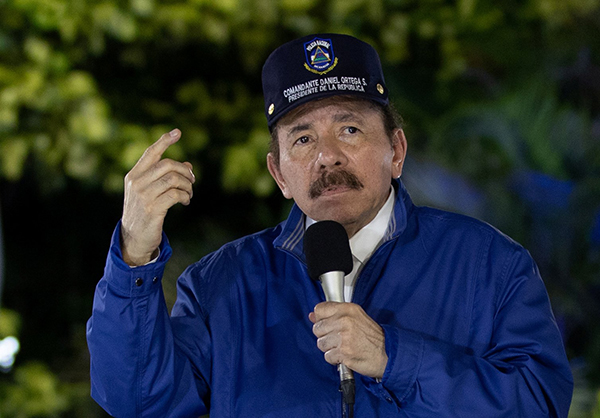
By Inés San Martín
SANTA FE, Argentina (Crux) – In a span of a few days, several members of the Catholic hierarchy in Nicaragua have spoken against the government of President Daniel Ortega and his wife, Vice President Rosario Murillo, denouncing them for attacking the freedom of the press and calling the government a dictatorship.
The Ortega regime is trying to enact laws that would limit free speech, treat missionary priests and foreign correspondents as “foreign agents,” and remove prison sentencing limits.
Bishop Abelardo Mata of Esteli on October 7 attacked the efforts of the government.
“The vice-president distilled her venom on Monday and insisted that they’re not going to allow any movement to endanger their family project,” he said. “Tonight, I can only tell our Celestial Father not to abandon us, to give us strength and determination to be able to save our nation. We lost it in the 1980s, please, not again.”
Bishop Mata was referring to when Ortega headed the communist Sandinista government in Nicaragua from 1979-1990.
The bishop is known for never mincing his words, and has even become the subject of a popular meme, where he is called “Abelardo con las tapas Mata” – with “tapas” being a popular way of saying “mouth,” and “Mata” in Spanish meaning “kills” – becoming “Abelardo with the killer mouth.”
Bishop Mata has long been outspoken against the Ortega government, after the former president regained power in 2007.
He also denounced the increase of violence in the country, particularly the rise of crimes against women.
Finally, Bishop Mata spoke about the persecution suffered by those who oppose the Ortega regime, including the recent murders of three opposition activists. He also condemned the targeting of independent news outlets by the security forces.
“With what right does he want to control the life of an entire country, when he himself is an illegitimate president? Therefore, everything he does is illegal. He has no right to be above the Constitution. He is the one who is obliged to respect the law. It is Ortega himself who has violated the law,” Bishop Mata said.
“These laws have no weight because they are vitiated by their origin, because Ortega is in power illegitimately,” he continued, before adding that the government “cannot take away civil and political rights, it cannot be above what our Constitution recognizes.”
On Sunday, Bishop Rolando Alvarez of Matagalpa said Nicaragua “is living a very delicate and complex time. We are gambling our future, the future of the country.”
Bishops Alvarez argued that political leadership is provoking a social fracture even greater than what already exists in the country.
“Those responsible for the laws must humbly listen to the people and closely attend to their needs,” he said.
Bishop Alvarez warned that the government must be “very careful not to violate fundamental freedoms and universal human rights, such as the right to truthfully inform and the right to freely express one’s thoughts.”
However, the series of bills introduced will most likely be approved on October 13, since Ortega has a majority in the country’s Constitutional Assembly.
The proposed law on cybercrime would allow the government to track postings on social media and prosecute users for opposing the regime.
Ortega is also pushing for a new law forcing all Nicaraguans who receive money from abroad to register as “foreign agents.”
Individuals or groups receiving money from abroad – for instance, a journalist or a priest – would be forced to abstain from political activity of any kind.
Amnesty International warned that the new laws had “intensified state repression against activists, human rights defenders and journalists … who criticize government policies, inform the population and defend human rights.”
On October 5, the Archdiocese of Managua warned that the Nov. 7, 2021, presidential elections could be at risk if these laws are passed.
“As an election year approaches, we share the concern of the people when they reflect that, if elections are held, they must first have the necessary and adequate conditions,” said the statement released by the archdiocesan justice and peace commission.
“Citizen participation [in elections] is unthinkable without the necessary information provided by the independent media, which are increasingly harassed,” the statement reads.
A series of anti-government demonstrations that begin in April 2018 led to the deaths of 328 protestors, who were killed by security and paramilitary forces. In addition, thousands were injured, imprisoned without trial, or forced to emigrate.
